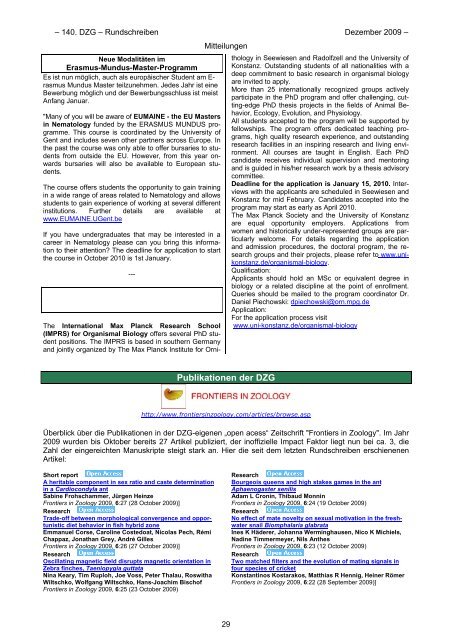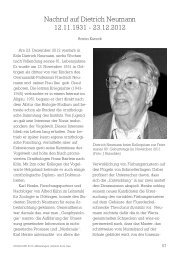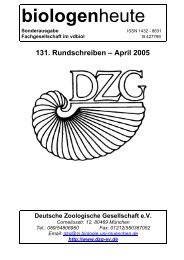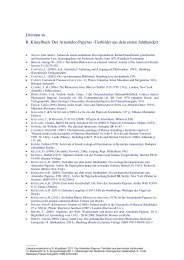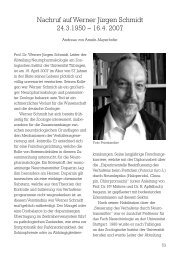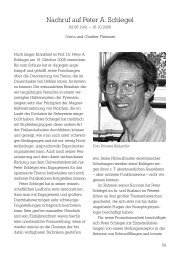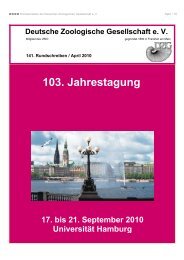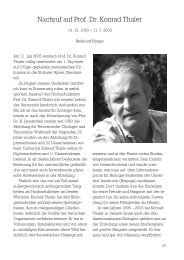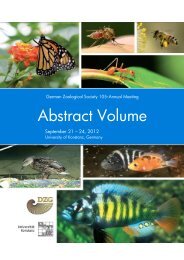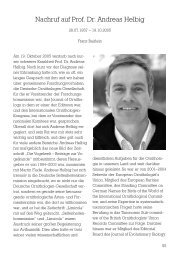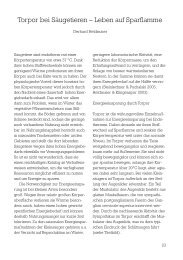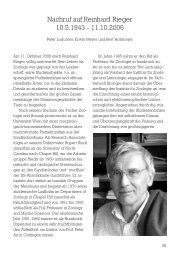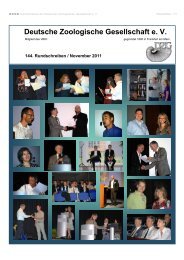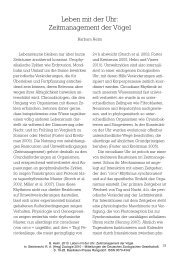Deutsche Zoologische Gesellschaft e. V.
Deutsche Zoologische Gesellschaft e. V.
Deutsche Zoologische Gesellschaft e. V.
Sie wollen auch ein ePaper? Erhöhen Sie die Reichweite Ihrer Titel.
YUMPU macht aus Druck-PDFs automatisch weboptimierte ePaper, die Google liebt.
– 140. DZG – Rundschreiben Dezember 2009 –<br />
Neue Modalitäten im<br />
Erasmus-Mundus-Master-Programm<br />
Es ist nun möglich, auch als europäischer Student am Erasmus<br />
Mundus Master teilzunehmen. Jedes Jahr ist eine<br />
Bewerbung möglich und der Bewerbungsschluss ist meist<br />
Anfang Januar.<br />
"Many of you will be aware of EUMAINE - the EU Masters<br />
in Nematology funded by the ERASMUS MUNDUS programme.<br />
This course is coordinated by the University of<br />
Gent and includes seven other partners across Europe. In<br />
the past the course was only able to offer bursaries to students<br />
from outside the EU. However, from this year onwards<br />
bursaries will also be available to European students.<br />
The course offers students the opportunity to gain training<br />
in a wide range of areas related to Nematology and allows<br />
students to gain experience of working at several different<br />
institutions. Further details are available at<br />
www.EUMAINE.UGent.be<br />
If you have undergraduates that may be interested in a<br />
career in Nematology please can you bring this information<br />
to their attention? The deadline for application to start<br />
the course in October 2010 is 1st January.<br />
---<br />
PhD POSITIONS AVAILABLE AT THE<br />
INTERNATIONAL MAX-PLANCK RESEARCH SCHOOL<br />
FOR ORGANISMAL BIOLOGY<br />
The International Max Planck Research School<br />
(IMPRS) for Organismal Biology offers several PhD student<br />
positions. The IMPRS is based in southern Germany<br />
and jointly organized by The Max Planck Institute for Orni-<br />
Mitteilungen<br />
Publikationen der DZG<br />
http://www.frontiersinzoology.com/articles/browse.asp<br />
thology in Seewiesen and Radolfzell and the University of<br />
Konstanz. Outstanding students of all nationalities with a<br />
deep commitment to basic research in organismal biology<br />
are invited to apply.<br />
More than 25 internationally recognized groups actively<br />
participate in the PhD program and offer challenging, cutting-edge<br />
PhD thesis projects in the fields of Animal Behavior,<br />
Ecology, Evolution, and Physiology.<br />
All students accepted to the program will be supported by<br />
fellowships. The program offers dedicated teaching programs,<br />
high quality research experience, and outstanding<br />
research facilities in an inspiring research and living environment.<br />
All courses are taught in English. Each PhD<br />
candidate receives individual supervision and mentoring<br />
and is guided in his/her research work by a thesis advisory<br />
committee.<br />
Deadline for the application is January 15, 2010. Interviews<br />
with the applicants are scheduled in Seewiesen and<br />
Konstanz for mid February. Candidates accepted into the<br />
program may start as early as April 2010.<br />
The Max Planck Society and the University of Konstanz<br />
are equal opportunity employers. Applications from<br />
women and historically under-represented groups are particularly<br />
welcome. For details regarding the application<br />
and admission procedures, the doctoral program, the research<br />
groups and their projects, please refer to www.unikonstanz.de/organismal-biology.<br />
Qualification:<br />
Applicants should hold an MSc or equivalent degree in<br />
biology or a related discipline at the point of enrollment.<br />
Queries should be mailed to the program coordinator Dr.<br />
Daniel Piechowski: dpiechowski@orn.mpg.de<br />
Application:<br />
For the application process visit<br />
www.uni-konstanz.de/organismal-biology<br />
Überblick über die Publikationen in der DZG-eigenen „open acess“ Zeitschrift "Frontiers in Zoology". Im Jahr<br />
2009 wurden bis Oktober bereits 27 Artikel publiziert, der inoffizielle Impact Faktor liegt nun bei ca. 3, die<br />
Zahl der eingereichten Manuskripte steigt stark an. Hier die seit dem letzten Rundschreiben erschienenen<br />
Artikel:<br />
Short report<br />
A heritable component in sex ratio and caste determination<br />
in a Cardiocondyla ant<br />
Sabine Frohschammer, Jürgen Heinze<br />
Frontiers in Zoology 2009, 6:27 (28 October 2009)]<br />
Research<br />
Trade-off between morphological convergence and opportunistic<br />
diet behavior in fish hybrid zone<br />
Emmanuel Corse, Caroline Costedoat, Nicolas Pech, Rémi<br />
Chappaz, Jonathan Grey, André Gilles<br />
Frontiers in Zoology 2009, 6:26 (27 October 2009)]<br />
Research<br />
Oscillating magnetic field disrupts magnetic orientation in<br />
Zebra finches, Taeniopygia guttata<br />
Nina Keary, Tim Ruploh, Joe Voss, Peter Thalau, Roswitha<br />
Wiltschko, Wolfgang Wiltschko, Hans-Joachim Bischof<br />
Frontiers in Zoology 2009, 6:25 (23 October 2009)<br />
29<br />
Research<br />
Bourgeois queens and high stakes games in the ant<br />
Aphaenogaster senilis<br />
Adam L Cronin, Thibaud Monnin<br />
Frontiers in Zoology 2009, 6:24 (19 October 2009)<br />
Research<br />
No effect of mate novelty on sexual motivation in the freshwater<br />
snail Biomphalaria glabrata<br />
Ines K Häderer, Johanna Werminghausen, Nico K Michiels,<br />
Nadine Timmermeyer, Nils Anthes<br />
Frontiers in Zoology 2009, 6:23 (12 October 2009)<br />
Research<br />
Two matched filters and the evolution of mating signals in<br />
four species of cricket<br />
Konstantinos Kostarakos, Matthias R Hennig, Heiner Römer<br />
Frontiers in Zoology 2009, 6:22 (28 September 2009)]


